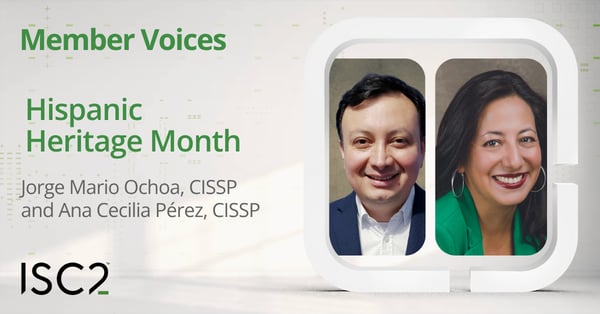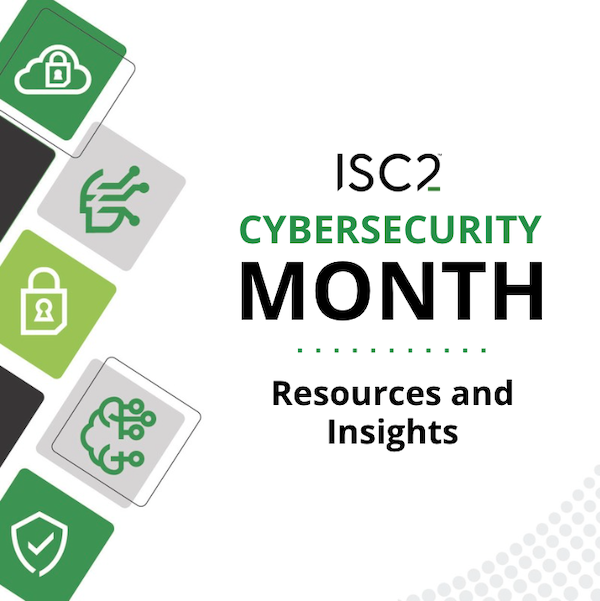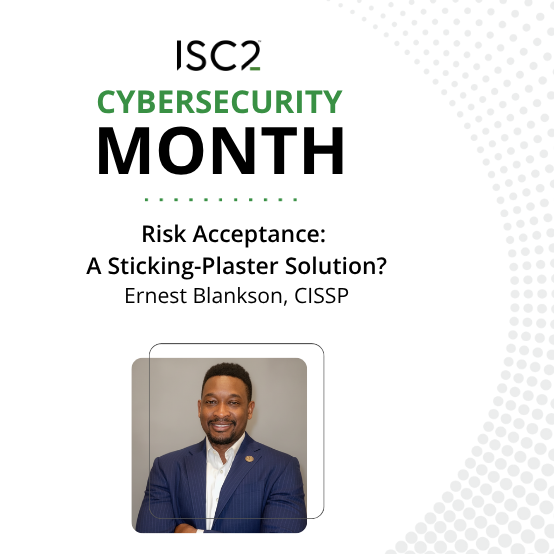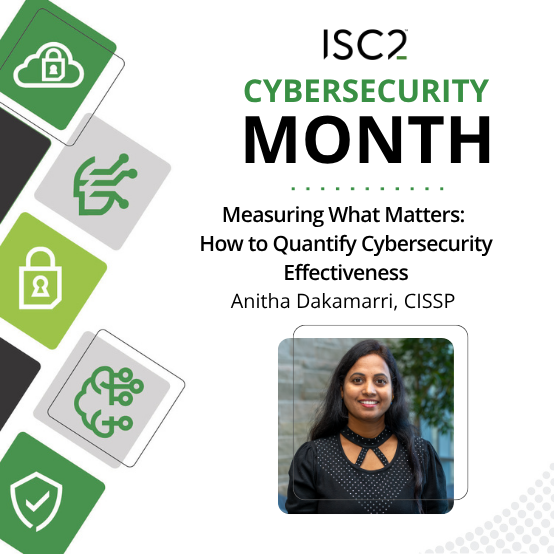As part of Hispanic Heritage Month, ISC2 Insights spoke with Jorge Mario Ochoa, CISSP and Ana Cecilia Pérez, CISSP about their cybersecurity careers, volunteering activities and how their professional pathway has intertwined with their Hispanic heritage.
 Disclaimer: The views and opinions expressed in this article belong solely to the author and do not necessarily reflect those of ISC2.
Disclaimer: The views and opinions expressed in this article belong solely to the author and do not necessarily reflect those of ISC2.
Hispanic Heritage Month is celebrated each from September 15 to October 15. It honors the histories, cultures and contributions of Americans whose ancestors came from Spain, Mexico, the Caribbean and Central and South America. The Hispanic community within the overall US cybersecurity workforce represents a major contributor US cybersecurity safety and security.
ISC2 members Jorge Mario Ochoa, CISSP and Ana Cecilia Pérez, CISSP are both highly experienced professionals and play a major role in bringing together cybersecurity professionals in their communities in Guatemala and Mexico through ISC2 Chapters. We spoke to both about what brought them into cybersecurity and about their efforts to support their peers.
Career Origins
“At 14 years old, my uncle encouraged me to study computing. I started with TLS, a DOS simulator and instantly became curious about how things work and how to improve them,” Ochoa said. “By 18, after earning a diploma in Digital Electronics, I applied to teach a computer repair course. I arrived at the interview not only with certifications but with a practical strategy: let students first work on broken computers to build confidence, then move to working machines. That initiative secured me the position—and shaped how I approach every opportunity: with preparation, creativity and purpose.”
Pérez went straight into cybersecurity, seizing the opportunity to work on some early groundbreaking projects. “I began my career in one of the pioneering cybersecurity companies in Mexico. I was part of the team that built the country’s first Security Operations Centers and later I was responsible for creating SOCs for financial institutions and public organizations. These early experiences gave me a unique foundation—combining technical expertise with business and operational impact”.
Ochoa noted that his foundation in IT helped facilitate the eventual move into cybersecurity. “Working in IT roles made my transition into cybersecurity seamless. I understood the importance of protecting the infrastructure I helped build.” The biggest challenge of making the move into cybersecurity evolving from operations to strategy and learning to align cybersecurity with business goals.
The Value of Cybersecurity Certifications
Both were very keen to highlight the important role of certifications and professional development in their career development and advancement, as well as explaining how it has become the basis for much of their industry volunteering.
“Certifications were a natural step to validate my expertise and to build credibility with executives, boards and clients,” explained Pérez. “The CISSP stood out because of its comprehensive scope—it covers governance, risk, compliance and technical domains. That holistic approach reflects the way I view cybersecurity: not just as a technical issue, but as a strategic business enabler and a matter of trust”.
“I’m convinced that experience is essential, but structure and methodology elevate it,” Ochoa added. “Combining these offers the best of both worlds. The CISSP represents depth, leadership and global standards. It’s more than a credential; it’s a symbol of trust”.
In addition to being a CISSP-certified professional, Ochoa also works as an instructor, helping to educate and develop others looking to enter and advance in a cybersecurity career.
“While studying for the CISSP, I realized there were smarter, more engaging ways to learn. I wanted to share what I discovered, so others could avoid common mistakes and gain confidence faster. Teaching amplifies impact. Helping others become CISSP-certified means building a stronger cybersecurity ecosystem—and that’s incredibly fulfilling,” he said.
Heritage and Cybersecurity
As ISC2 members in Hispanic communities, both talked about the influence of their culture on their careers and their pursuit of opportunities.
“Being Hispanic gives me insight into the realities and opportunities of our region,” said Ochoa. “Latin America is full of undiscovered talent—people who, with a little coaching and opportunity, can achieve amazing things. Through ISC2, I work to amplify those voices, mentor emerging talent and create space for Latino professionals to thrive globally.”
This point was echoed by Pérez, talking about her experience as a cybersecurity professional in Mexico. “Coming from Mexico and working across Latin America has deeply shaped my perspective. I have seen firsthand how cultural, economic and educational realities impact cybersecurity readiness. This has driven me to adapt global best practices into inclusive and practical solutions for our region.”
Pérez added: “It also fuels my commitment to digital equity: ensuring that families, schools, and small businesses—often the most vulnerable—have access to the knowledge and tools to stay safe online”.
Pérez is involved with many initiatives in the region, including chairing the Cybersecurity Committee of ALETI and AMITI, and representing the region in international cooperation forums like the D4D Hub events in Madrid, Cartagena and Antigua Guatemala, where cybersecurity is framed as a key driver for development
Working with Chapters in Guatemala and Mexico
Both Ochoa and Pérez are heavily involved with the ISC2 Chapter community, with Ochoa serving as Chapter President in Guatemala and Pérez a founding member of the Mexico City Chapter. We asked what their motivation was for getting involved with their local chapters and what they aim to achieve through volunteering.
“I believe cybersecurity is a collective mission,” explained Pérez. “The ISC2 Mexico City Chapter gave me a platform to give back, share knowledge and create opportunities for professional growth. In particular, I coordinate the Women Task Force initiative, where we provide guidance and support for women preparing to earn certifications such as the CC and the CISSP. We are very proud to see not only Mexican women, but also women from across Latin America joining us.”
The ISC2 Mexico City Chapter was recently recognized for its work as part of the 2025 ISC2 Global Achievement Awards.
“Volunteering with ISC2 is deeply aligned with my personal mission: to serve, empower, and elevate others,” Ochoa added. “It also allows me to contribute to a virtuous cycle of talent development, where each professional helps lift the next. Being part of the Guatemala Chapter and global ISC2 efforts has given me a sense of purpose and connection I deeply value”.
Advice for Volunteering as a Cybersecurity Professional
Both agreed that volunteering and contributing strengthens careers while making a tangible difference in a community.
“My advice is to take the first step,” Pérez shared. “Attend an event, share your expertise or mentor someone. Volunteering is not only about giving your time; it’s about learning, building meaningful connections and shaping the future of our profession.”
Ochoa summed up by saying that the best ideas often come from within our own communities. By stepping up, we don’t just give back—we gain perspective, purpose, and connection.
“My advice? Get involved. Be the difference”.


